Thank you once more, dear friends, for all your kind words! I hope you will not be disappointed with the chapter that follows...
With the demise of Seleukid power the bond between Pahlavans and Baktrians, united in struggle against common enemy, loosened and the relations between the two kingdoms were becoming sour.
After unification of the three Persian kingdoms under his rule, while Seleukids became a mere protectorate of his, Pahlavan king Arshak assumed the title of Shahanshah that was used by the Achaemenid Great Kings of the past. This act, however, also implied a formal claim on the lands of Baktrians, as these were all once conquered by Cyruz the Great and thenceforth a part of Persian Empire. Aria was reputed to be the old country of from which all Persians once came from, while Baktria used to be the richest and the most prestigious satrapy of the realm. The vaunt of the full royal title of Arshak, the Great King, King of Kings, King of countries, and the Light of Arians, was thus a menace to Baktrians, as their hardly gained independence from the Seleukids seemed to be challenged again. And there were also other, more immediate, concerns on both sides.
On one hand, Shahanshah Arshak was worried that Basileus Agathokles, unlike his father and grand-father, did not leave the command of Basilikos Stratos (The King’s Own Army) upon his ascension to the throne. Rather, Agathokles commissioned his son Demodamas to take over the generalship of Dytikos Stratos (The Western Army), while he himself remained at the helm of Basilikos Stratos and ruled the realm from its camp. For his warlike nature made him feel uncomfortable among splendid palaces and ornate temples of Baktra, while he enjoyed the life amidst his troops who tolerated and even admired his roughness and daring. Agathokles, who’s motto was “Prepare in peace what you need in war” (and war was never far away from his thoughts), reinforced the army with a corps of elephants received from his Indian provinces, introduced field artillery, and exercised all different branches of his army to act together in a swift and concerted manner. To an outside observer, however, this intense training and build-up might seem like preparations for attack and it is no wonder that Arshak was gravely concerned by that.
On the other hand, Basileus Agathokles too had good reasons to be suspicious of his western neighbour. Under the thin surface of Hellenistic kingdom, Baktria, and especially her western provinces of Aria and Drangiana, was still inhabited largely by Persians who might respond favourably to Arshak’s claims rather than uphold the congenial, yet foreign, dynasty of Hellenic kings. It did not escape Agathokles’s notice, how Arshak earlier often stirred rebellion among Persian nobles against their Seleukid overlords. Therefore Agathokles considered the strength and loyalty of his soldiers to be of prime importance in the circumstances and did not dare to trust the command of the two principal armies to anybody else but to himself and to his son. Moreover, his somewhat arrogant sense of pride prevented Agathokles from approaching Arshak in a friendly manner and attempting to renew the mutual sympathy that existed between his late father and the Persian Shah.
As too often in the history of human folly, Fear, Mistrust and Ambition had conspired again to uproot Peace and had planted a seed of War in its stead, which spindled and flourished and brought plentiful reaping.
It was Arshak who struck first. The campaign was carefully planned in advance and put Basileia Baktria in utmost peril. The overture was a minor rebellion, induced by Persian money, of mountain tribes in Paropamisadai. To quell this disturbance, Agathokles led his army thither, thus leaving the western border guarded only by his son Demodamas with Dytikos Stratos (The Western Army). This happened in late autumn of the year thirty-one of Eleutheria (translators note: i.e.229 BC). Early next spring the war broke out as large Persian force, led by certain Farrokhmard, invaded Aria and marched on Alexandreia. Demodamas therefore led his army north to protect the city, whereupon the Farrokhmard sharply changed direction towards Baktra. The intent of this manoeuvre was to lure Dytikos Stratos (The Western Army) into encirclement as another Persian army, led by general Gondofar, advanced to fall into Demodamas’s back. At the same time third Persian army led by the satrap of Astauene and one of the highest ranking nobles of the realm, Suren Haushyangha, was to invade Aria from south-west, induce local Persian nobility to revolt and take over the province.
Precise timing and surprise were precondition to the success of the whole scheme and ultimately also the cause of its failure. Because the plan failed to take into account the speed with which Baktrian armies could march throughout the realm, thanks to excellent roads, built with great care and expense by Theodotos and Diodotos. Luck also intervened in Baktrian’s favour, because Shah Arshak himself was unable to lead the campaign in person, as he was incapacitated for several weeks by sudden sickness. Poisoning was suspected, but nothing was proved.
Not long after the first Persian troops crossed the border, Basileos Agathokles was notified of their invasion through his well-organized system of royal post and was able to immediately return from the eastern mountains in a heroic forced march of unprecedented speed and to block the advance of Farrokhmard’s army. This in turn allowed Demodamas to face the Gondofar’s army in confidence with his rear now being secure.
Surprised by the unexpected return of Basilikos Stratos (The King’s Own Army) to the west, Farrokhmard had to abandon the original plan of clenching and destroying the army of Demodamas between himself and Gondofar, and he had no other choice than to face Agathokles instead. Agathokles took a convenient defensive position along a mild elevation, prepared to launch an immediate pursuit should the enemy attempt a withdrawal. Farrokhmard, though, attacked confidently, and while he kept Baktrian centre, formed by formidable phalanx of Pezhetairoi, in check by a slowly approaching phalanx of his own, he sent most of his heavy cavalry to crush Baktrian left flank while annoying Baktrian right flank with the rest.
However, as Pahlavan cataphracts and Median lancers climbed up the hill to charge onwards, they saw, to their trepidation, ominous silhouettes of Baktrian war elephants which were until then hidden below the horizon. Scared by the unfamiliar smell and roar of the mighty beasts, Persian chargers lost much of their momentum and baulked. At that moment Agathokles charged them in turn with his elephants followed by Baktrian cavalry and light infantry with that. The Persian attack collapsed almost immediately and their whole right flank was routed. Afterwards Persian phalanx in the centre was crushed by the steady advance of Pezhetairoi from the front and assault of Baktrian light infantry from the rear. With that, the few remaining Persian units on Baktrian right flank were forced to retreat as well. Of the great army of twenty-eight thousand, less than one in five escaped, while less than two thousand Baktrians were lost.
At the same time, still unaware of the return of Basilikos Stratos (The King’s Own Army) and subsequent defeat of Farrokhmard’s army, Persian general Gondofar led his fifteen thousand men onwards, supposedly in pursuit of Dytikos Stratos (The Western Army) under Demodamas. Great was then his surprise, when his scouts informed him that Demodamas is marching on in battle order to meet him, while Farrokhmard is nowhere to be seen. Gondofar had barely the time to withdraw on a nearby hill, taking defensive position in a forest there. Undaunted, Demodamas ordered his troops to charge uphill and engage the Persians in hand-to-hand combat as they were mostly archers and thus would be in disadvantage against Baktrian heavy infantry. Demodamas also sent his Arachosian light cavalrymen around both flanks of the enemy in a broad encircling movement. Convenience of high ground was of no avail to Persians when faced with disciplined advance of Baktrian line infantry in stout armour bristling with spears, while Arachosian mounted javelineers harassed Persian rear by missiles. Once Gondofar himself met his death in the fight, the rest of his men either surrendered or fled away.
Encouraged by this victory, Demodamas pressed forward to the south, as the third Persian army under Suren Haushyangha was reported to operate between Alexandria in Aria and Propthasia in Drangiane, stirring revolt and looting the countryside. This was the smallest of Persian invasion forces, less than ten thousand strong, as Suren was not supposed to fight regular Baktrian armies, but to inspire uprising and lay siege to Baktrian garrisons. These expectations, however, quickly proved wrong, because local nobles were hesitant to rise against their King, as they were quite satisfied with their current status and unwilling to bet on uncertain future. Before long Suren learned of the catastrophic defeats of the other two Persian armies and recognized that his mission would be in vain. Accordingly he begun to withdraw back to Astauene, but he was hindered on his march by numerous ambushes and other sorts of annoyance, because the two resounding Baktrian victories induced local nobility to prove their loyalty by resisting the invaders forcefully and attacking them on sight.
Demodamas, on the other hand, was kept well informed of Suren’s movement and was quickly gaining on him. When the two armies met, the Persians stayed no chance against Baktrian superiority in numbers, arms, and training and they were all duly killed or taken into captivity. Suren Haushyangha himself saved his honour if not his life as he fell in battle, fighting bravely to the bitter end.
Meanwhile, immediately after the victory over the Persian army of Farrokhmard, Basileos Agathokles retaliated by launching an invasion of his own into Persian province of Margiane, which was only a decade ago conquered by Pahlavans from the Seleucids and where Shahanshah Arshak was reputed to momentarily reside.
When the horrid news of the crushing defeats of Persian armies and Baktrian counterattack into Margiane reached Arshak’s court in Antiocheia, he was overwhelmed yet unbroken. He hastily gathered the survivors from the abortive invasion, reinforced them with all troops he could get in the province and being still too sick to campaign himself, he nominated his trusted bodyguard Barazan to lead them in his stead. The most opportune place where to face advancing Baktrians appeared to be the Valley of Snakes, where the merchant road from Baktra to Antiocheia passes through a deep valley, whose forested slopes would provide an excellent cover for ambush. Here, however, Persian hopes were shattered by the extraordinary speed with which the Basilikos Stratos (The King’s Own Army) marched, being conditioned by long and extensive training under Agathokles. Thus the Baktrians passed through the Valley of Snakes before the Persians arrived. This in turn put Barazan into difficult situation. He was already on the western bank of Oxus and did not dare to cross the mighty river again with enemy so close to his rear. Therefore he was obliged to form his men into battle order and attack Agathokles against all odds.
The battle took place on a place which favoured the Baktrians who were tactically on the defensive. Their left flank was protected by a sheer cliff that protruded from the surrounding plain, while on the right there was open woodland that covered Baktrian infantry from charge by imposing Persian cataphracts. The space in between was barred by phalanx of Pezhetairoi and spearmen with elephants and cavalry in reserve. Barazan opened the battle by a powerful charge along the edge of the forest, but was unable to penetrate through Baktrian lines. His cavalry and greater part of infantry were soon entangled in melee, while the rest of his troops tried to circumvent the Baktrian line through the forest only to be slaughtered by Baktrian light infantry which was hiding there. Thereafter Agathokles run his cavalry around in a wide right hook and charged the Persians from their rear. Outnumbered and encircled they surrendered immediately while Barazan committed suicide on the spot.
This defeat deprived Arshak of the last chance to stop the Baktrians before they reach Antiocheia. For the majority of her citizens hailed from Macedonian veterans, who would be more favourable to their Baktrian kinsmen rather than to their defeated and deserted Persian king, Shahanshah Arshak did not risk to be besieged in Antiocheia and fled away to Parthia to mobilize his vast realm for the next season of the war.
Free from her Persian garrison Antiocheia threw her gates open to Agathokles, who confirmed its status as Hellenic polis and capital of the whole Margiane, which was formally annexed to Basileia Baktria as an allied state. This happened at the very beginning of the thirty-third year of Eleutheria (translators note: i.e. 227 BC) and in the second year of the reign of Basileus Agathokles, of which Oxobazes was the historian.
Late Baktrian mosaic depicting Agathokles as he receives submission from Antiocheia in Margiane







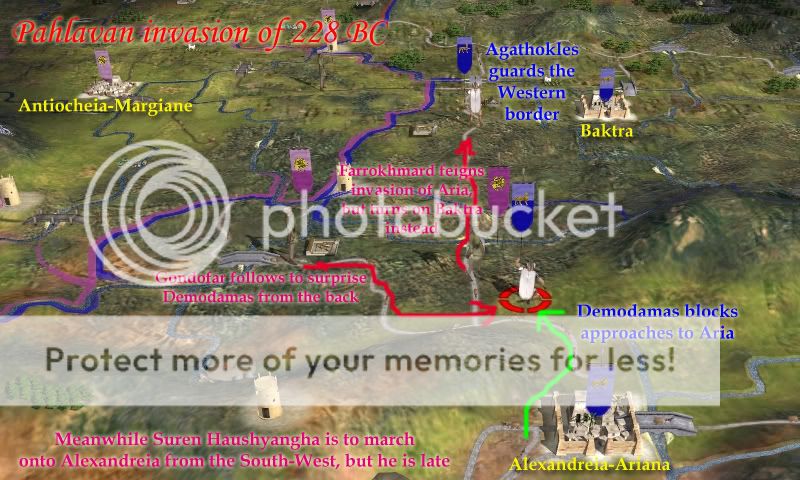
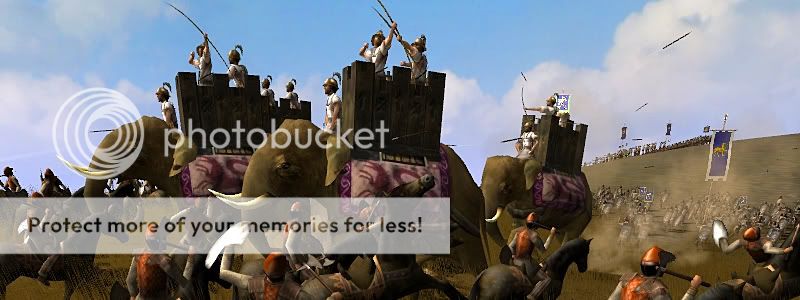
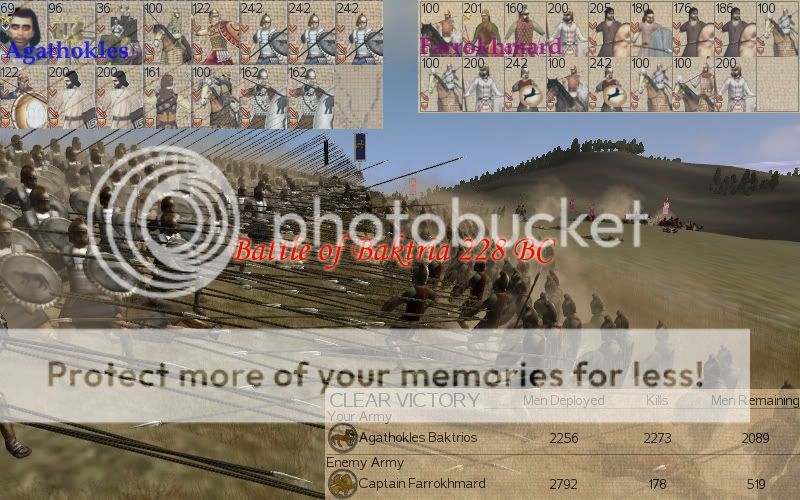
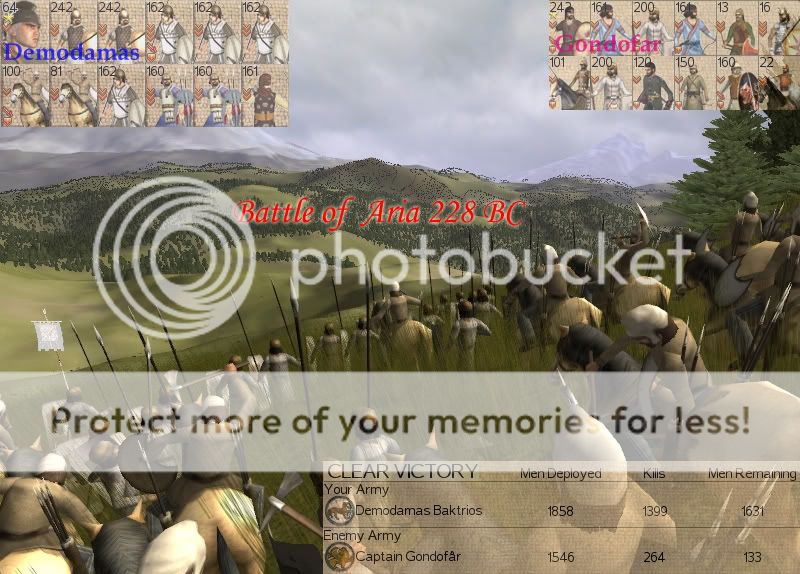
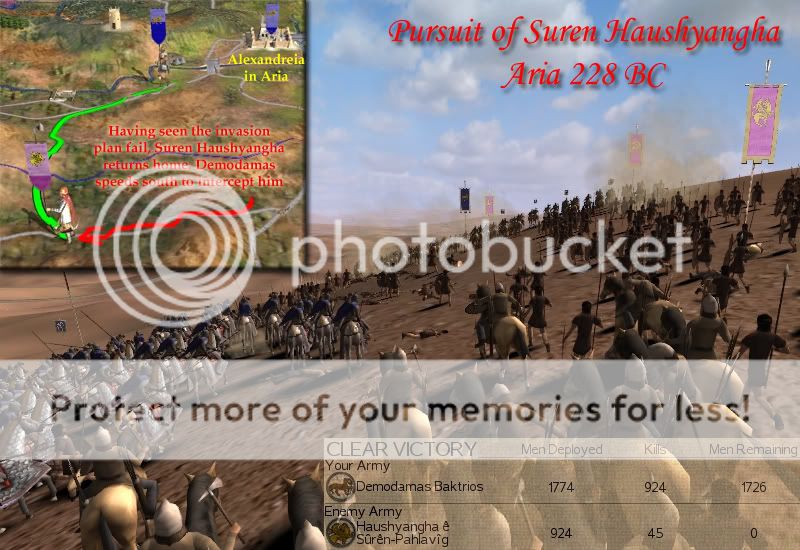
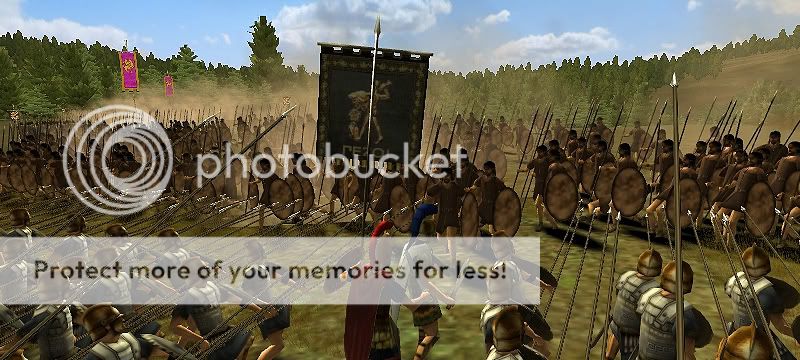
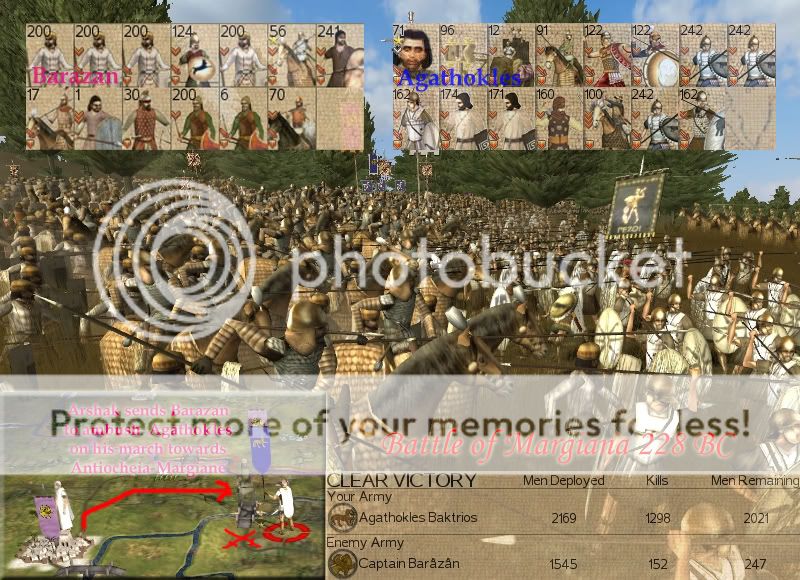





 Reply With Quote
Reply With Quote
Bookmarks